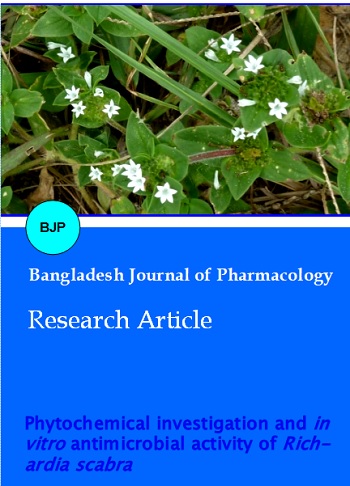Phytochemical investigation and in vitro antimicrobial activity of Richardia scabra
DOI:
https://doi.org/10.3329/bjp.v11i2.24666Keywords:
Antimicrobial, Richardia scabraAbstract
The present study was aimed to evaluate the phytochemical screening and antimicrobial activity of the petroleum ether and methanol extracts from the mature leaves of Richardia scabra from India. Disc diffusion method was used to determine the zone inhibition of the tested samples for antibacterial and agar plug method was used to determine the antifungal activity, while the microtube-dilution technique was used to determine the minimum inhibitory concentration. Both extracts showed significant antibacterial and antifungal activities when tested against 10 bacterial and four fungal strains. The minimum inhibitory concentrations of the methanol extract of R. scabra ranged between 12.5100 ?g/mL for bacterial strains. Alkaloids, steroids, flavonoids, fatty acids, terpenoids and simple sugar were detected as phytoconstituents of extracts. To the best of our knowledge, this is the first report against antimicrobial activity of common weed species R. scabra found in India.
Downloads
528
441 Read
175

Additional Files
Published
How to Cite
Issue
Section
License
Authors who publish with this journal agree to the following terms:
- Authors retain copyright and grant the journal right of first publication with the work simultaneously licensed under a Creative Commons Attribution License that allows others to share the work with an acknowledgement of the work's authorship and initial publication in this journal.
- Authors are able to enter into separate, additional contractual arrangements for the non-exclusive distribution of the journal's published version of the work (e.g., post it to an institutional repository or publish it in a book), with an acknowledgement of its initial publication in this journal.
- Authors are permitted and encouraged to post their work online (e.g., in institutional repositories or on their website) prior to and during the submission process, as it can lead to productive exchanges, as well as earlier and greater citation of published work (See The Effect of Open Access).
